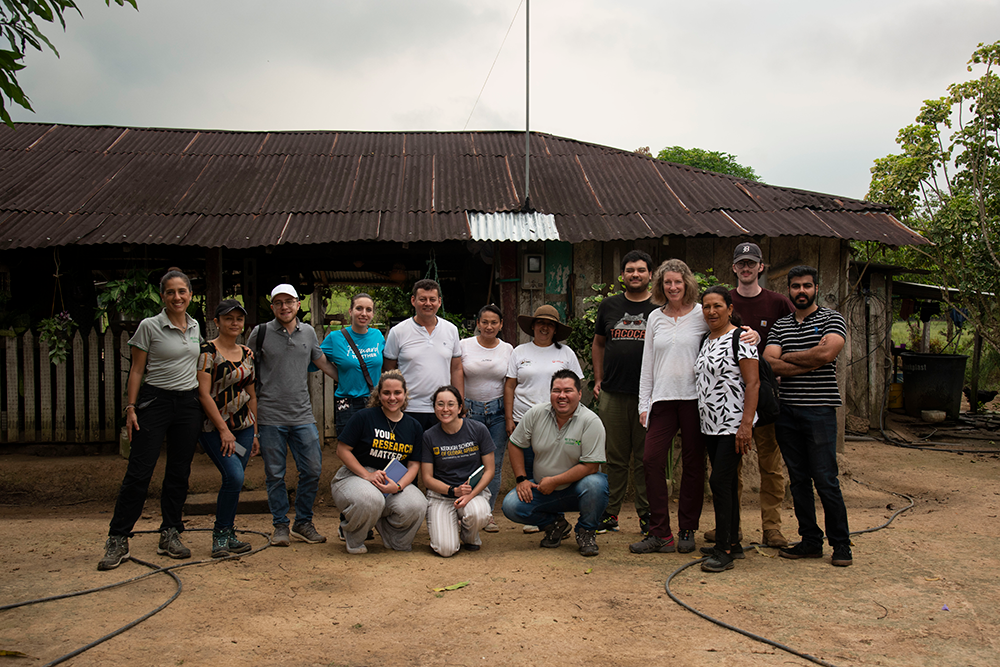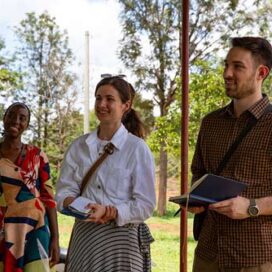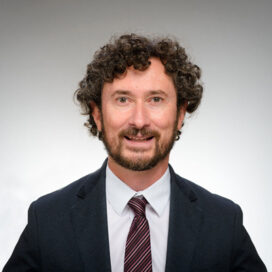Latest Frontlines course applies frameworks to regenerate economies, ecologies
Partners, students co-create approaches to community flourishing.
Published: May 28, 2024 / Author: Business on the Frontlines

A Notre Dame REEL class visits a former coca farm in Colombia.
Don Eladio Quevedo has been waiting.
At last, as the heat of the day begins to mellow, several white 4×4 trucks pull to a stop in front of his farm. The students he’s been expecting unfold themselves from the vehicles they’ve traveled in since dawn, stretch and lumber toward his house. A dome of blue sky and pink late afternoon clouds stretches above them.
“Bienvenidos! Buenas tardes!” he boomed, walking toward them, arms outstretched, smile wide. In no time, he’s leading the group toward his crops. He points out his plantains, yams, rice, peas and tabena. The interpreter jogs to keep up with him and translate his enthusiastic descriptions. Before long, the tired students re-energize, buoyed by the zeal Don Eladio radiates — and the dinner his family prepares and serves to them — as he describes his efforts to revitalize his corner of the Colombian Amazon.
The visitors are University of Notre Dame graduate students in Richard “Drew” Marcantonio’s (Ph.D. ’21, M.A. ’18) REEL class, which stands for Regenerating Economies and Ecologies for Livelihoods. The course is the latest addition to the Meyer Business on the Frontlines Program. Though it features similar aspects to other Frontlines classes, like business problem solving with international partners working in communities dealing with poverty or economic exclusion, it offers a few key differences. For one, environmental sustainability techniques factor prominently in the course. Another, the student groups include specialists in science, engineering and global affairs.
Don Eladio and his wife, Dona Flor, are two of the many former coca growers the students have visited during their week in the Colombian department of Guaviare in March. The Quevedos are leaders in COOMFASOL, a cooperative focused on regenerative agriculture and supported by PASO Colombia, a longtime partner of Business on the Frontlines and current partner to the student team visiting the Quevedo’s finca or farm.
Over the last century, extractive industries have turned Guaviare’s land from a rainforest jungle to a hunting ground for animal furs to rubber plantations to coca fields to now large-scale cattle ranching. Deforestation and wide-spread use of pesticides for coca eradication have degraded the soil, endangered wildlife like jaguars and disconnected Guaviarians from their land. This spring these students and their PASO partners co-created an approach to support COOMFASOL’s mission of cultivating and commercializing sustainable agricultural products in Guaviare and providing a stable livelihood for former coca farmers.
Interdisciplinary teams cultivate a variety of ideas
Marcantonio, assistant teaching professor, has taught in the Mendoza College of Business since 2022; his interest in focusing on businesses on the community level, where most businesses actually operate, inspired him to create this new course.
“Smallholder farming is a business; it is the single most common business globally. In order for smallholders to flourish, you need a flourishing environment and a flourishing economy. When these businesses flourish, communities flourish,” he said.
Environmental, social and governance (ESG) is the fastest growing area in consulting, and Marcantonio wants to prepare MBAs and other graduate students for this future. Creating REEL brought together his research interest in regenerative and durable livelihoods, environmental management, environmental violence and peacebuilding.
The course is interdisciplinary in nature. Students learn social systems thinking and mapping, holistic management practices and strategic planning while each bringing the strengths of their own discipline to bear on the project they’re co-creating with their partner organizations. During the first half of the spring semester, students meet in class twice a week and as needed with their partners to conduct research on the communities and collaborate on a project objective. Then, during spring break, students travel to their partners’ communities to spend a week on the ground conducting field research and analysis. Teams spend the final half of the semester asynchronously concluding their project together. In spring 2024, three teams of six students traveled to three locations – two in Colombia and one in Uganda – as part of REEL.
One of the first people Drew called upon after receiving the go ahead to develop the course was Father Arthur Ssembajja (MBA/MGA ‘22), who was the first person to earn the dual degree. While enrolled in the Business on the Frontlines flagship course, Ssembajja and his team partnered with a Honduran nonprofit bolstering small business development through education. Currently completing a doctorate in economics at the University of Tubingen in Germany, he conducts research with Frank Germann, the Viola D. Hank Associate Professor of Marketing at Mendoza, and is the pastor at St. Anthony de Padua in South Bend.
A native of Uganda, Ssembajja serves on the board of Bethany Land Institute (BLI), a 367-acre integral ecology and agricultural demonstration farm and school located in a deforested area north of Kampala. There, caretaker trainees spend two years learning regenerative farming practices and product commercialization. Marcantonio envisioned BLI as a perfect REEL partner and asked Ssembajja to serve as adviser.
“One thing that got me hooked was the component of academic and practical accompaniment,” said Ssembajja. “Going in to learn with and accompany for a long time. All the projects that REEL is working with now, they’re going to be continued for five years.”
Marcantonio developed REEL in partnership with the Notre Dame Environmental Change Initiative (ND-ECI). Jen Tank, ND-ECI director and the Galla Professor of Biological Sciences, and other ND-ECI faculty helped shape the projects and create fellowship opportunities for advanced Ph.D. students, post-docs and junior faculty who have an area of expertise that matches well to a project or a partner and can advise the student teams.
“A lot of students and faculty in the sciences and engineering want to make their work applicable to the lives of people,” said Marcantonio. “They’re bringing value to the partner and to the student team by advising them on environmental and engineering literacy broadly and contributing from their specific area of expertise, which we try to match to the different projects.”
Mitchell Liddick, a Ph.D. candidate in biological sciences, was the ND-ECI fellow and adviser for the group that partnered with BLI. During collaborative strategic planning sessions between the students and their BLI counterparts, he wondered about testing the farm’s soil.
“He started studying the soil component,” said Ssembajja. “As it’s studied across three, four, five years, does it have more nutrients come back because of this regenerative science that’s being applied?”
His question led the team to set up a memorandum of understanding between BLI and Uganda’s Makerere University for soil sampling every six months. Samples are analyzed at their laboratory, and then sent to Tank’s lab for further analysis and storage.
“Such a thing would not have happened if we didn’t have a soil specialist,” said SSembajja.
Environmental peacebuilding through business
In the arid northern region of La Guajira, Colombia, a third REEL team partnered with PASO Colombia, working with a cooperative called COOMPAZCOL. The co-op is composed of former combatants in the country’s 52-year armed conflict who signed the peace agreement in 2016 and are focused on reintegration into society and financial sustainability.
“Initially, we thought we’d focus a lot more on water,” said Sergio Medina (MBA ‘24), a second-year MBA student on the team. “We were digging into conserving water, what type of methods could we recommend for their agricultural sector.”
The team interviewed co-op members to better understand their needs and those of their businesses like dairy or textiles. They applied a systems map, one of the tools they’d learned in class, to visualize connections and gaps between all businesses and people they encountered, linking their stories back to COOMPAZCOL’s core values and their products, services and assets. What emerged was a flowchart-like image synthesizing much of the team’s takeaways and informing their recommendations.
As the students were analyzing their findings and working through a final deliverable, Medina says he appreciated the interdisciplinary nature of the groups, reminding him of their partner’s goal of caring for the land.
“Our adviser said I was thinking too much like an MBA for some of the businesses,” Medina said. “This is where my teammates helped me think differently and not just, ‘Let’s put some money here, scale it and then they’ll be fine.’”
Further south in Guaviare, Claudia Paola Salcedo, the team’s main partner from PASO Colombia, appreciates how the students’ input transformed marketing efforts.
“The students provided financial models for ecologically sustainable products to enable our businesses to be both economically and environmentally sustainable,” she said. “Providing for both is necessary for the communities.”
Future possibilities and research opportunities
His first REEL class concluded, Marcantonio is now focusing on applying lessons learned and looking at research possibilities.
“It was all new this year, but now there are deliverable examples to provide to next year’s students,” he said. “I’ll take this year’s work and say, ‘This is what right looks like; you can still improve this, so don’t start from scratch. Use this, make it better.’”
Likewise, partnerships with BLI and PASO Colombia will build on the work accomplished this year.
In addition to the soil sampling research with BLI, which Liddick is not only turning into a paper but also a chapter of his dissertation, other research projects have emerged from the first year of REEL.
Gustavo Da Silva, Ph.D. candidate in biological sciences and the ND-ECI adviser for the Guaviare team, studies vector-borne diseases. He’s established a new research partner in PASO and has already returned to Colombia, looking at ways to help communities battle malaria, a topic which will eventually be part of his dissertation.
“We’re using the REEL platform to get physical science publications that also provide value to our partner to show their models are working, or not,” Marcantonio said. “How much is it working? We can measure that now.”
That measurement will provide a sense of accomplishment to all involved. Anna Thomas (MBA/MGA ‘24) who worked with PASO Colombia in Business on the Frontlines in 2023 and partnered with BLI during REEL this year, plans to take time off from her job in strategy and planning at Bank of America and return as an adviser next year.
“I think it’s really important for there to be opportunities like this, that focus on empowering partners and seeing tangible change,” she said. “It’s really special that in this class there’s a set length of partnership of five years. It’s walking with them in the process and each year collaborating with what’s the next step, where else can people fill in and help building historical knowledge and accompaniment.
“Hopefully the impact grows each year.”
Originally posted on Business on the Frontlines.
Related Stories




